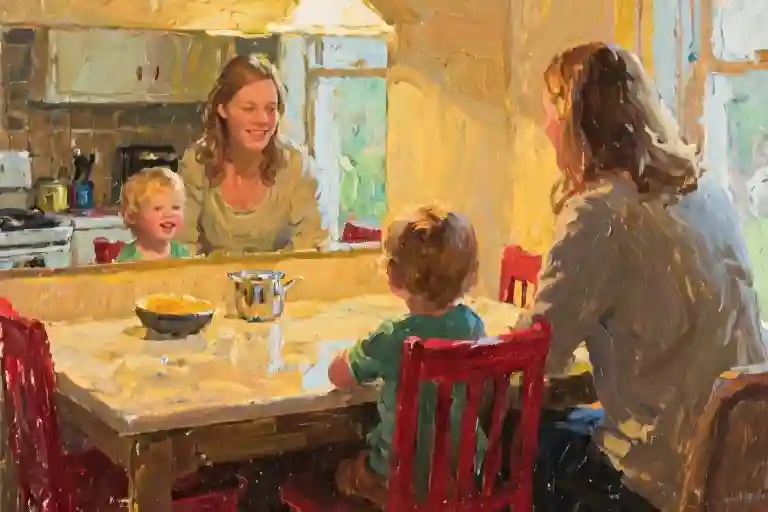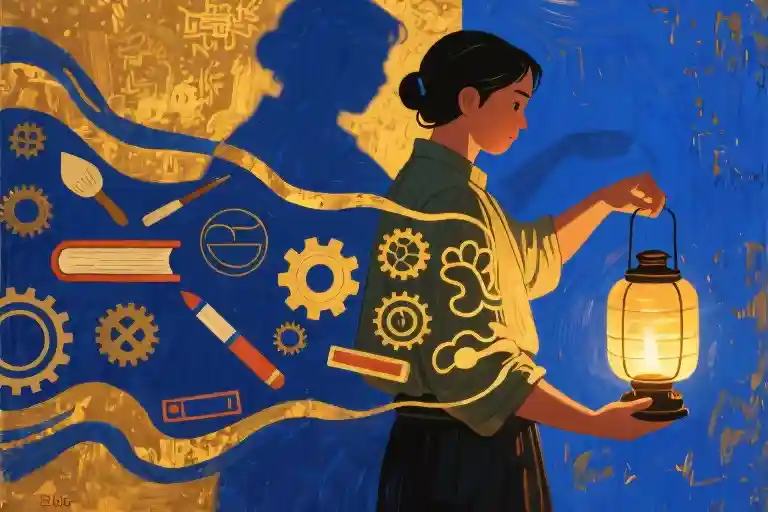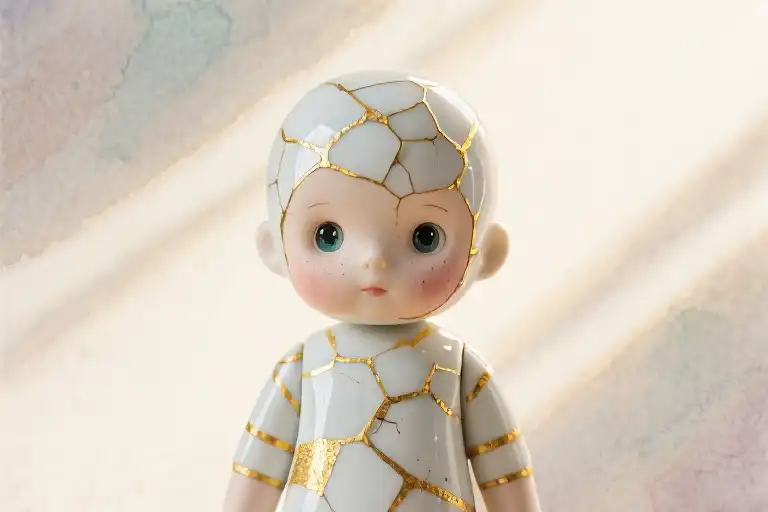There’s a particular kind of clarity that arrives with motherhood, sharper than any mirror you’ve ever faced. In those bleary-eyed early days, when the baby finally sleeps and you’re left staring at your unfamiliar reflection in the midnight bathroom light, you begin to understand – this tiny human isn’t just learning from you. You’re being studied right back, with terrifying precision.
We enter parenthood armed with parenting books and grand plans about the lessons we’ll impart. The lullabies we’ll sing, the values we’ll instill, the bedtime stories that will shape their worldview. Few prepare us for the humbling truth: our children become our most relentless teachers, exposing truths about ourselves we’ve spent decades avoiding.
That gummy smile reflecting back at you? It’s not just adorable – it’s the world’s most effective truth serum. When my son first laughed at my exaggerated sneeze, I didn’t just hear delight. I heard an echo of my own father’s way of turning mundane moments into comedy, a trait I’d forgotten I possessed. The way his tiny brows furrow when concentrating? A perfect replica of my own ‘thinking face’ I’ve never actually seen. These living mirrors don’t just show us our surface traits – they reveal the hidden architecture of who we are.
The classroom appears when you least expect it. During what should have been a simple diaper change, my wriggling baby boy taught me more about patience than any meditation app ever could. His fascination with crawling toward electrical outlets became my crash course in vigilance. Even his food-throwing phase (why do toddlers find airborne carrots so hilarious?) forced me to confront my own control issues. Each developmental stage holds up a new mirror, and the reflection isn’t always flattering.
What makes these lessons so potent is their delivery method. Children don’t sit us down for lectures. They teach through relentless repetition and innocent questions that cut straight to the heart of matters. ‘Why are you sad, Mama?’ asked during a stressful workday doesn’t just prompt a quick reassurance – it demands you examine why you’re pretending everything’s fine. Their brutal honesty about our singing voice or fashion choices becomes masterclasses in authenticity.
Perhaps the greatest gift of this unexpected education is how it reshapes our understanding of growth. We imagine parenting as a linear journey where wise adults guide ignorant children. The reality is far messier and more beautiful – a spiraling dance where teacher and student constantly trade places. My son’s unfiltered joy during rainstorms reawakened my own capacity for wonder. His complete lack of self-consciousness in dancing to supermarket muzak challenged my own inhibitions.
This reciprocal learning continues long after the baby years fade. The preschooler negotiating an extra storybook at bedtime teaches communication skills no corporate workshop could match. The kindergartener’s endless ‘why’ questions refine our ability to explain complex concepts simply. Even teenage eye-rolling (coming soon to my future, I’m sure) will undoubtedly offer advanced lessons in humility and perspective.
The most surprising lesson waits in those quiet moments when you catch your child displaying a strength you’ve always wished you had. Seeing my son confidently march up to new playmates at the park, no hesitation, no fear of rejection – it stings with bittersweet recognition. That fearless version of myself exists, just thirty years removed. Maybe she’s still in there somewhere.
Motherhood’s mirrors don’t just show us who we are – they reveal who we might become. Our children reflect back not only our flaws and forgotten traits, but our dormant possibilities. Each tantrum we navigate grows our emotional intelligence. Every scraped knee we comfort stretches our capacity for empathy. The sleepless nights somehow expand our ability to love beyond what we imagined possible.
So here’s to our smallest professors, these relentless truth-tellers who accept no tuition except our presence. May we have the courage to keep looking into motherhood’s mirrors, even – especially – when the reflections surprise us.
The Mirror Effect: What Our Children Force Us to Face
There’s something profoundly unsettling about seeing your worst traits reflected in a three-foot-tall version of yourself. Parenthood has this uncanny way of holding up a mirror to all the parts we’ve carefully ignored or neatly packed away. That explosive temper you thought you’d outgrown? The impatience you’ve masked in professional settings? The perfectionism you’ve worn as a badge of honor? Your child will find them all, unpack them with gleeful abandon, and present them back to you in high definition.
I remember the first time it happened clearly. My toddler was taking what felt like geological ages to put on his shoes while we were already late for preschool. As I felt that familiar heat rising in my chest, heard that sharp tone creeping into my voice, I suddenly recognized something terrifying – I was watching my own mother’s frustrated outbursts from childhood, now with me playing her role. The realization hit like cold water. All those years I’d spent silently judging her impatience, and here I was recreating the same dynamic with my own child.
Psychologists call this phenomenon projection – we unconsciously attribute our own unacceptable feelings or traits to others. With children, it becomes particularly intense because they serve as blank screens for our emotional projections while simultaneously being genetic replicas carrying our actual traits. They mirror us in both literal and metaphorical ways.
What makes this mirroring so uncomfortable is its brutal honesty. Children haven’t learned to filter their reactions yet. When my son recoils from my raised voice, his raw fear reflects back the disproportionate intensity of my anger. When he mimics my sigh of exasperation while waiting in line, it reveals my poor tolerance for delay. These aren’t conscious judgments on his part – just pure, undistorted reflections of what we model.
Yet within this discomfort lies the gift. That morning with the shoes, instead of descending into self-flagellation about being a ‘bad mom,’ I paused. I kneeled down to his level, took a breath I should have taken earlier, and said what I wish someone had said to me during childhood meltdowns: ‘We’re not in a hurry. Let’s try again together.’ In that moment, parenting became less about managing his behavior and more about healing old wounds in myself.
This mirror works both ways though. Just as children reflect our flaws, they also magnify our strengths in ways we often fail to see ourselves. The patience I didn’t know I possessed surfaces during the fifth retelling of his favorite story. A capacity for wonder I’d thought lost long ago returns when watching him examine a ladybug. These reflections too are true, perhaps even more so because they emerge unbidden in the unguarded moments of daily parenting.
The invitation isn’t to perfect ourselves before this relentless mirror – an impossible task – but to approach these reflections with curiosity rather than shame. Each tantrum we navigate with presence, each frustrated tear we meet with compassion, becomes an opportunity to rewrite old scripts. Our children don’t need flawless parents. They need authentic ones willing to grow alongside them, even when that growth means facing uncomfortable truths in the mirror they hold up to us.
The Anatomy of Self-Criticism: More Than a Spilled Plate
The dining table scene replays in slow motion whenever I close my eyes. There’s the cheerful chaos of dinner time – my son’s spaghetti-stained grin, the way his tiny fingers clumsily grip the fork, that infectious giggle when I make a silly face. Then the sudden tilt of the plate, the suspended moment when time stretches like taffy before ceramic meets hardwood with a spectacular crash. Bolognese sauce arcs through the air like abstract expressionist paint, landing in Rorschach blots across the floorboards.
What happens next reveals more about me than the accident itself. My breath catches, shoulders tense – not at the mess, but at the immediate script running through my mind: You should’ve been watching closer. Now he’ll never learn table manners. Other mothers wouldn’t let this happen. Meanwhile, my son has already fled to bury his face in the sofa cushions, his small body shaking with the kind of tears that come from anticipating disappointment.
The Emotional Domino Effect
Parenting mirrors our deepest reflexes. In that fractured moment, three reactions tumbled over each other:
- Instant Anger (0.2 seconds): A flash of irritation about the wasted food and cleanup ahead
- Guilt Tsunami (2 seconds later): Watching his fearful retreat, realizing my facial expression caused it
- Meta-Frustration (5 seconds in): Being angry at myself for feeling angry, spiraling into Why can’t I stay calm like those mindful parenting blogs say?
The sauce wasn’t the only thing that needed mopping up.
Breaking the Cycle
What changed that evening wasn’t some grand parenting technique, but a simple realization mid-cleanup: My son wasn’t crying over spilled pasta – he was crying over the reaction he expected based on past experiences. My pattern of internal self-scolding had external consequences.
The ‘3-Breath Reset’ became our lifeline:
- First breath: Acknowledge the physical reaction (clenched jaw, raised shoulders)
- Second breath: Separate the event from the narrative (This is a mess vs. I’m a bad mom)
- Third breath: Choose the next action from love, not fear (hug first, mop later)
Somewhere between wiping sauce off the baseboards and tomato-smeared cuddles on the couch, it hit me: Our children don’t need perfect parents – just present ones who keep showing up, sauce stains and all. The real lesson wasn’t about table manners, but about how often we confuse mistakes with moral failures, and how that binary thinking shapes our children’s views of themselves.
That night, as I tucked in a boy who’d gone from sobbing to giggling about ‘the flying spaghetti monster,’ I recognized the gift hidden in the mess. These moments aren’t interruptions to perfect parenting – they’re the exact curriculum we both need.
Redefining Education: Graduating Together Through Tears
Parenthood has a way of dismantling our most carefully constructed definitions. We enter this journey believing we’ll be the teachers, the guides, the steady hands shaping little minds. Then life hands us a spaghetti-covered reality check. My son’s most profound lessons didn’t come from any parenting manual, but from watching how he navigates the world with unselfconscious grace.
The Curriculum of Imperfection
Children have this miraculous ability to expose our hidden perfectionism. That evening with the Bolognese disaster became my masterclass in self-acceptance. As I knelt beside my sobbing child, something shifted. His tiny shoulders shook not just from the broken plate, but from anticipating disappointment. In that moment, I recognized my own reflection – not in the shards on the floor, but in his fearful eyes mirroring my habitual self-criticism.
We eventually cleaned up together, his little hands clumsily helping with the paper towels. ‘Mama’s messy too,’ I admitted, showing him the sauce stain on my sleeve from last week’s dinner. His giggle broke the tension like sunlight through storm clouds. That’s when I understood: our children don’t need flawless role models. They need authentic humans who demonstrate how to embrace life’s beautiful messes.
Lessons in Presence
If you want to study mindfulness, observe any toddler thoroughly engrossed in watching ants march across pavement. My son’s capacity for presence puts my meditation app to shame. While I multitask through meals mentally compiling grocery lists, he examines each blueberry with scientific fascination. His world exists in the now – not in yesterday’s regrets or tomorrow’s anxieties.
This became painfully clear during our rushed morning routines. My frantic ‘hurry up’s’ would bounce off his deliberate pace as he methodically buttoned his jacket. The more I pushed, the slower he moved, until one day I finally paused. Kneeling to his level, I saw something miraculous: he wasn’t being difficult. He was simply existing completely within each moment, unaware of clocks and schedules. My impatience said more about my fractured attention than his behavior.
The Curiosity Renaissance
Somewhere between college graduation and mortgage payments, many of us lose our sense of wonder. My son reignited mine through his endless ‘why’ questions that initially drove me to caffeine. Why is the sky blue? Why do cats purr? His insatiable curiosity forced me to confront how often I operate on autopilot, accepting reality without inquiry.
Our bedtime ritual transformed when I stopped deflecting his questions with ‘that’s just how it is.’ Now we explore answers together, sometimes through books, sometimes through simple observations. Last week we spent twenty minutes studying a spiderweb after he asked how the threads don’t break in wind. In relearning how to wonder, I’ve discovered parts of myself that had gone dormant.
Your Turn to Share
These lessons continue unfolding in ordinary moments – when he forgives my mistakes before I forgive myself, when he dances without caring who watches, when he persists through frustration with a resilience I envy. Motherhood’s classroom has no final exam, only daily pop quizzes that reveal where I still need growth.
What unexpected lessons has your child taught you? Perhaps it’s patience during tantrums, or finding joy in puddle jumping. Maybe it’s seeing your own childhood through new eyes. However these teachings arrive – through laughter or tears – they remind us that education was never meant to flow one direction. The most transformative learning happens when we humble ourselves enough to become students alongside our children.
The Unexpected Graduation Ceremony
We enter parenthood with lesson plans and milestones charts, armed with parenting books and well-meaning advice. But somewhere between the sleepless nights and the spaghetti-stained onesies, the curriculum gets flipped. The student becomes the teacher, and the diploma we earn isn’t for raising a child—it’s for rediscovering ourselves.
That Bolognese sauce incident wasn’t just about a broken plate. As I knelt on the kitchen floor wiping red splatters off the tiles, something shifted. My son’s tear-streaked face reflected back more than just childhood embarrassment—it mirrored my own lifelong habit of shrinking from mistakes. In his trembling lower lip, I saw every time I’d berated myself for spilled coffee or missed deadlines. His instinct to hide echoed my own perfected art of self-criticism.
This is the secret syllabus of motherhood: while we’re busy teaching children how to tie shoes and say please, they’re conducting masterclasses in emotional archaeology. My toddler’s unabashed tantrums unearthed my own suppressed frustrations. His boundless curiosity about ants and cloud shapes reawakened my atrophied sense of wonder. Even his resistance to naptime became a mirror showing my own unhealthy hustle culture.
The most profound lessons often arrive in the messiest packages. That time he insisted on wearing mismatched boots revealed my hidden conformity. When he cried because I hurried past a sidewalk worm, it exposed my chronic rushing. Each parenting challenge carries dual enrollment—we’re simultaneously teaching behavior and learning about our own unexamined patterns.
Perhaps this is why parenting feels so exhausting yet so transformative. We’re not just shaping little humans; we’re being reshaped ourselves. Those tiny hands tugging at our sleeves are also pulling back curtains on rooms within us we’d forgotten existed. The playground becomes a therapy couch, bedtime stories turn into revelation sessions, and yes, even food disasters transform into breakthrough moments.
Tonight, when you’re tucking in your little professor, take a moment to reflect: what unexpected lesson appeared in today’s chaos? Maybe it came disguised as a meltdown over broken crackers, or perhaps it whispered through sticky fingers clutching your face. Parenting’s greatest gift isn’t the child we raise—it’s the person we become through the raising.
So here’s my final exam question, fellow students of parenthood: What have your children recently taught you about yourself? The answer might just be scribbled in tomorrow’s crayon masterpiece or hidden in the next spilled milk incident.





